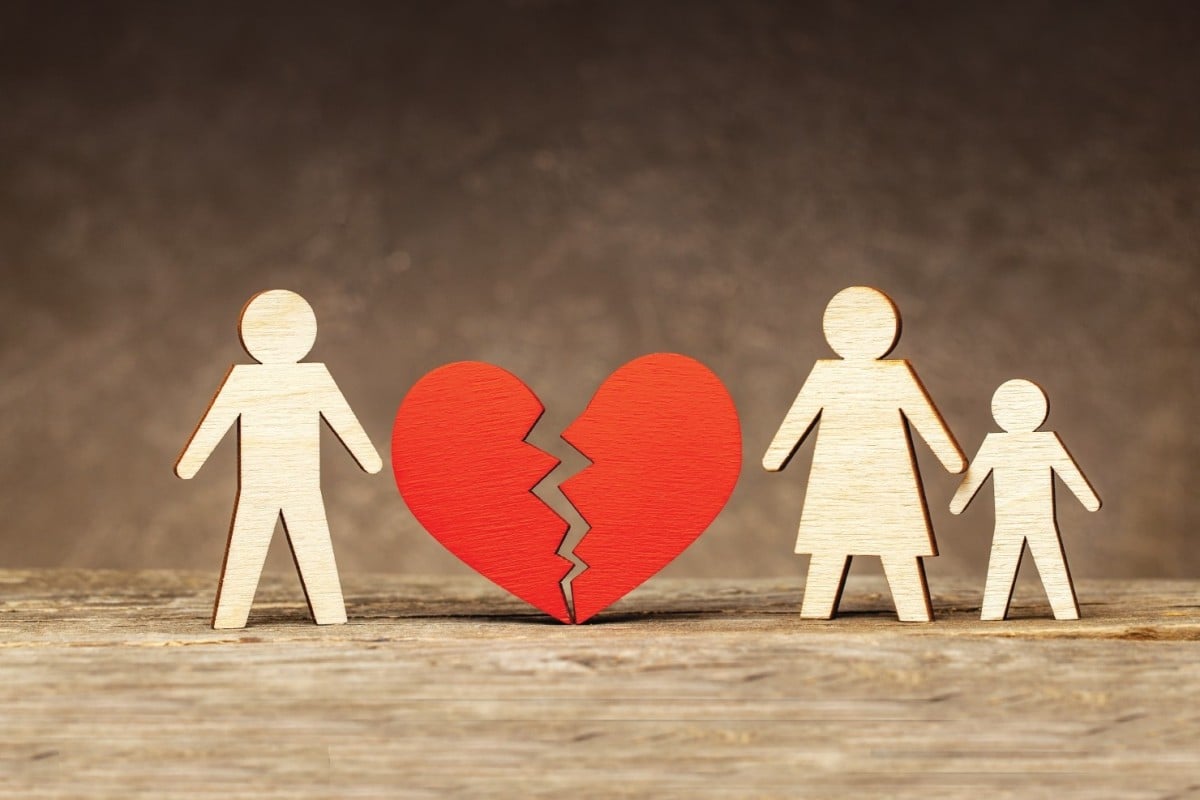
Struggles of divorced fathers in Hong Kong custody battles to show they can also care for their children
- Ahead of Father’s Day, a recently divorced dad shares his hope that society will recognise fatherhood’s importance for a child’s well-being
- Children’s psychologist stresses that parents need to focus on supporting their kids, who might be struggling to process their emotions
 A psychologist urges parents to focus on the needs of their children during a divorce. Photo: Shutterstock
A psychologist urges parents to focus on the needs of their children during a divorce. Photo: ShutterstockEver since his son was born five years ago, Tony* has been by his child’s side tending to his needs. The two have been inseparable – playing soccer together, going to the beach and talking about cars.
“We do everything together, even eating, taking a shower,” the 30-year-old said. “[There] was not a moment that I’m away from my son.”
For Father’s Day, he plans to take his five-year-old to church before attending a craft workshop together.
Even after Tony and his son’s mother divorced last year, they have been splitting time with their child equally.
But soon, the doting father might not be seeing his son as much: his ex-wife wants to raise their son in mainland China, even though the child has lived his whole life in Hong Kong so far.
Divorce in Hong Kong: What happens to you if your parents split up?
Despite trying to negotiate with his son’s mother, the matter was eventually taken to court. A social welfare officer was sent to assess the situation and make a recommendation to help the court decide if the mother could leave the city with their son.
Ahead of the day dedicated to honouring fathers, Tony said he hoped society would understand the challenges faced by dads in custody battles and recognise fatherhood’s impact on a child’s well-being.
“I hope he can grow up happily with the presence of both parents, inspired by both parents [to] discover and unleash his creativity and talents,” said the father, who runs his own business in Hong Kong.
“[Though] not in the role of a husband but I try to ... preserve the status quo of having a complete family,” he said, adding that he hoped to continue sharing custody of his son equally with his ex-partner.
Custody battles
Because both parents have residency in Hong Kong, Tony wanted to keep his son in the city, where he could be nurtured by both parents.
As a hands-on father who has a strong bond with his son, Tony hoped the social welfare officer would see that it was best for his ex-wife to stay in Hong Kong to maintain shared custody of their son.
But the father shared that the officer’s report recommended the mother’s relocation be granted.
He was distressed.
Rita Ku, a family lawyer in Hong Kong with more than 20 years of experience, suggested the city’s cultural background could explain why the legal system sometimes seemed to favour the mother in custody cases.
“We are Chinese, and usually, the mother takes a more hands-on role on [raising] the children than the father. So there is a tendency to have a decision in favour of the mother,” the partner at Rita Ku & Ser explained. “Compared to the mothers, it’s quite difficult ... [for] fathers during the process because very often mothers would take the upside of the battle. For example, they’re usually saying that they are the main carer of the child.”
According to Hong Kong’s Guardianship of Minors Ordinance, “a mother shall have the same rights and authority as the law allows to a father”.
When contacted by Young Post, the Hong Kong Judiciary said it did not have official data on the ratio of child custody cases granted to mothers versus fathers.
What to do when your parents are getting a divorce
But Ku and her team went through the published judgments of cases on the judiciary website from 2018 to 2022. They found that of the 102 cases in those five years, 18 ended with sole custody granted to the father, compared to the 56 cases where the mother won sole custody.
In 21 of these cases, the decision was for joint custody with the father having primary care and control. Only 7 cases had joint custody with equally shared care and control by both parents.
Ku added that they had not looked into the justifications behind these custody case settlements.
In her experience, the lawyer shared that fathers sometimes had to fight harder in court for custody. But Ku hoped to challenge the stereotype that mothers were always better carers, arguing that fathers should have an equal starting point in court unless concrete evidence proved otherwise.
Focus on what children need
Amid increasing divorce rates in Hong Kong, there are many children affected by their parents’ separation. But it does not have to be a traumatic experience for kids if parents are conscious of what their children need.
Lora Lee, a psychologist who specialises in working with children, explained that during divorce, kids often went through a cycle of grief over the end of their parent’s marriage. But youth typically have less control over how they express their feelings.
“They also often do not receive enough support, as many of them are unable to verbalise their feelings – this usually manifests in behavioural issues,” the professional said.
For children without a strong support network or sense of self, the grieving process can be tough, leaving them with little energy to cope with academic and social demands.
“I have seen children getting stuck in the anger stage – they can act like a mean child as they are so hurt inside,” Lee added. “When parents are able to put aside their hurt feelings and their fear, they are more likely able to focus on the needs of their children.”
This is also Tony’s biggest wish for his son. For now, his child was “coping well” with staying half a week with each parent, the father said.
“I want to minimise the impact on him as much as possible,” Tony explained.
Looking at photos of his son, he could not help but be emotional thinking about a future where his son might be far away.
“I’d be devastated if I were to see him once a month only,” Tony said, grabbing a tissue. “I’m hopeful [that] society could look at such cases with a blindfold, and just simply evaluate a relationship, irrespective of the gender, whether one is a mother or a father. That is my only hope.”
*Full name withheld at the interviewee’s request.
Doting 寵愛的
showing a lot of love for somebody, often ignoring their faults
Custody 監護權
the legal right or duty to take care of or keep somebody/something; the act of taking care of something/somebody
Hands-on 事必躬親的
doing something rather than just talking about it
Guardianship 監護人身份
the state or position of being responsible for somebody/something
Judiciary 司法機構
the judges of a country or a state, when they are considered as a group
Traumatic 造成精神創傷的
extremely unpleasant and causing you to feel upset and/or anxious
Manifest 表現
to show something clearly, especially a feeling, an attitude or a quality
Blindfold 蒙眼布
something that is put over somebody’s eyes so they cannot see
